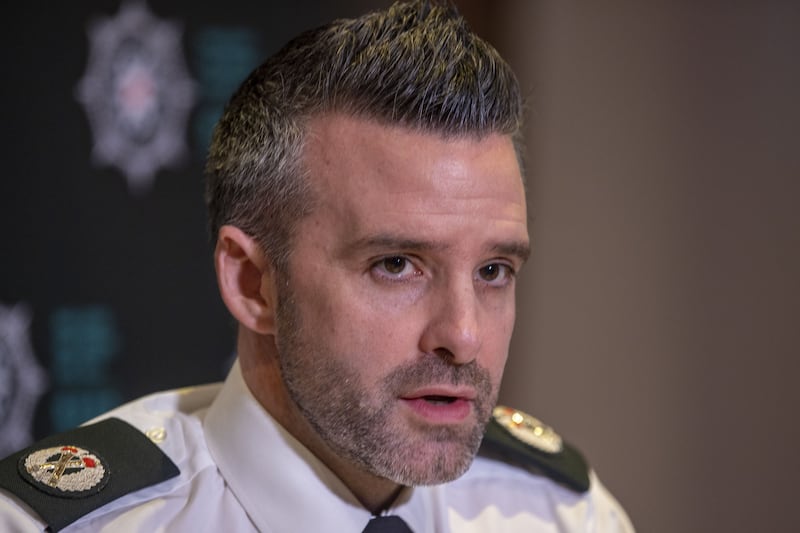THERE are 35 organised crime gangs in Belfast being "monitored and managed to a varying degree" by the PSNI.
Around a quarter of them have "some kind of paramilitary ancestry", while a further 15 per cent have some kind of foreign or "extra-terratorial" gangs, mainly from China and eastern Europe.
To be classified an organised crime gang, a group needs just two or more members engaged in serious crime.
In north Belfast, known paramilitary gangs include the West Belfast UDA, the INLA, Action Against Drugs (AAD), New IRA and the a breakaway faction from Óglaigh na hÉireann known as the Irish Republican Brotherhood (IRB) - understood to have later been rebranded the Irish Republican Movement.
"Smaller organised crime gangs are easier to dismantle, the bigger the group, the more challenging it becomes," said Detective Superintendent Bobby Singleton, head of the PSNI Organised Crime Unit.
Read More:
- Drug users taking cocktails of prescription medication, coroner warns
According to Mr Singleton, "75 per cent" of organised crime gangs operating in the greater Belfast area are involved in drugs, "either directly or indirectly in distribution at street level".
The interconnectedness of these groups is manifested in many ways, not least some gangs extorting others, for example cannabis `farms' forced to pay `tax' to local crime lords for the right to operate in their area.
So while the gangs, themselves are distinct, their spheres of influence can overlap through co-operation or subordination.

"When it goes down to street and local level, paramilitary organisation will seek to make their presence felt," he said, although not along the traditional sectarian lines.
"I've seen plenty of evidence to suggest ideological persuasion comes a distant second to making profit. They'll work with anybody."
According to police analysis, around 60 per cent of organised crime falls into the category of "conventional criminality".
Read More
- How criminal gangs are preying on a young generation increasingly being lost to drugs
- Drug users taking cocktails of prescription medication, coroner warns
"There are no flags of convenience, they exist for one purpose and one purpose only - selling drugs, extortion, blackmail, modern slavery and human trafficking and excise fraud," Mr Singleton said.
"... Because of the way the conflict happened, they got involved in extortion and robbery as means of (making money). Many groups are no longer trying to advance any form of campaign in that (ideological) respect, (but) opened a box that they can't close.
"I think there are people within paramilitary organisations who want to do things differently, but also a significant proportion that would like to take the money, the finance involved and also the kudos in the community."

And that kudos remains significant, with paramilitary groups punching above their weight in respects within some areas.
He warns that "paramilitary groups are still actively trying to recruit young people on basis of ideology", who then find themselves involved in the grim underbelly of organised crime.
"I don't think paramilitaries are the biggest (players) in terms of revenue, but the impact on communities is disproportionately worst because of how they geographically spread themselves."
Drugs gangs "start off with people as customers, then their debt grows and they use them to sell their product". The gangs are, in turn, extorted by paramilitaries and "effectively being co-opted" into working for them.
Recent operations by his unit have targeted extortion at building sites and exploitation, in particular human trafficking and prostitution and he likens them to parasites.
"If they see any legitimate business set up they will exploit and extort that."
He said the key to disrupting and disbanding the gangs is to work collaboratively, both with government justice agencies and within communities".
Nothing is insurmountable, the senior officer insists, despite the bleak picture he paints of almost endemic criminality in some areas, pointing out that the once ubiquitous `cash-in-transit' robberies and so-called `tiger kidnappings' "have basically (been) done away as a crime type".
Mr Singleton stressed the "very important" need to "provide people with positive role models... (and) discourage people from getting involved in the drug scene initially".
He pointed out that "leading figures would definitely aspire to be hands off", leaving the street level dealing and its inherent risks of arrest and imprisonment to young people.
Despite the damage being wreaked on communities by bezos and opiods, PSNI figures show "the biggest drug in Northern Ireland remains cannabis", which "a significant proportion of people appear to think is not illegal".
It is, however, "a gateway drug", and the same dealers are supplying harder drugs, Mr Singleton said.
In addition, `polydrug misuse' is a growing problem.
"When you make that cocktail, you're taking your life in your own hands. Look at the people having their lives claimed by drugs and drug and alcohol misuse."
And in the midst of the morass of criminality and turf wars is the "exploitation of young people".
"In situations where young people find their options limited, an inability to access education and employment there would be a lure to be part of organised crime. It is a whole societal problem.
"It's about working with communities to provide options. It's about changing cultures and equipping communities to be able to develop and improve themselves."








